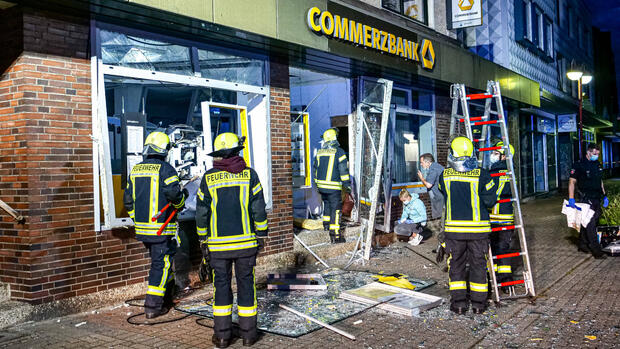Berlin, Frankfort In view of the recent sharp increase in the number of ATM blasts, the federal and state governments are considering imposing increased protective measures by law on banks and savings banks. Baden-Württemberg’s Interior Minister Thomas Strobl (CDU) told the Handelsblatt that ATM operators and manufacturers must ensure more security, for example through the use of fogging technology or coloring and adhesive systems. “If this does not happen on a voluntary basis, the manufacturers and operators of the ATMs will be legally obliged to implement suitable protective measures.”
This is also how the Federal Ministry of the Interior of Department Head Nancy Faeser (SPD) sees it. In the event that the agreed measures were “not adequately” implemented and the crime situation “does not improve demonstrably and to the required extent”, the ATM operators would have to be subject to legal obligations. “Now the credit industry is responsible for implementing these measures quickly and consistently,” Faeser told Handelsblatt.
The interior ministers of Bavaria and North Rhine-Westphalia made similar statements.
It is no coincidence that politicians are now increasing the pressure on financial institutions. The number of ATM demolitions rose sharply again in 2022. With 496 cases, a “new high” was recorded, the Federal Ministry of the Interior announced. This corresponds to an increase of 27 percent compared to the previous year.
Severe damage to buildings and danger from debris
In mid-March, investigators from seven federal states succeeded in finding dozens of arrests. At the beginning of February, several men were also arrested in a raid in the Netherlands. But the explosions don’t stop.
>> Read here: Why banks now want to do without thousands of ATMs
The police assume that most of the crimes are committed by a criminal scene from the Netherlands, which is several hundred strong. The explosive attacks cause enormous property damage. The buildings housing branches and ATM locations are often damaged. Experts consider it a fortunate coincidence that no bystanders have been seriously injured in the attacks, despite the debris and splinters flying around.
In order to put a stop to the perpetrators, the police and politicians also rely on banks and vending machine manufacturers. Many banks no longer allow access to ATMs between 11 p.m. and 6 a.m. and close the anterooms to the branches or self-service foyers.
The explosive attacks cause enormous property damage.
(Photo: IMAGO/3S PHOTOGRAPHY)
They also often already use video transmission systems, demolition and vibration detectors, special security systems for windows and access doors, fogging technology and systems that discolor banknotes in the event of an explosion.
Banks reject legal regulation
The banks reject regulations by law and consider the burden sharing to be inappropriate. “From our point of view, a legal regulation is the wrong approach and does not do justice to the basic distribution of tasks in our state community,” said the German banking industry on request.
“It is difficult to understand that the sole responsibility for preventing demolitions should lie with banks and savings banks.” The cash infrastructure can only be secured in cooperation with politicians and law enforcement agencies. It was agreed after the “round table”. From the point of view of the financial sector, there are no universally effective preventive measures.
NRW Interior Minister Herbert Reul (CDU) is well aware that the problem cannot be contained overnight. “We’re dealing with the modern form of bank robbery here,” he said. In order to fight this, it takes “staying power”. There is a good exchange with the operators of ATMs. Obliging them to take higher protective measures would therefore be “the ultima ratio” for him.
Bavaria’s Minister of the Interior, Joachim Herrmann (CSU), is initially relying on voluntary measures at the banks to make it as difficult as possible for the perpetrators. In addition, one is guided by the procedure of the Federal Ministry of the Interior, which is currently reviewing the recommendations for appropriate security and preventive measures by ATM operators. “The extent to which further steps are necessary from our point of view depends on the result of this evaluation.”
Bundesbank gives the green light for bonding technology
Baden-Württemberg’s Minister of the Interior Strobl referred to the neighboring countries, which are already successfully using coloring and adhesive systems to render cash unusable in the event of an explosion. The German ATM operators and manufacturers “have to follow suit”.
The Bundesbank has now given the go-ahead for the use of bonding technology in Germany. “The requirements of the Deutsche Bundesbank for applications for reimbursement of bonded banknotes have been confirmed by the credit institutions as achievable,” the central bank said on request. With regard to reimbursement, nothing stands in the way of using such a robbery stop system.
With the gluing technique, the banknotes become a lump after the explosion and can no longer be counted. However, the sum contained can be tracked electronically. However, the German banking industry emphasizes that the adhesive systems are not yet marketable and certified.
More: Fight against blowing up ATMs: The first savings banks have branches guarded
